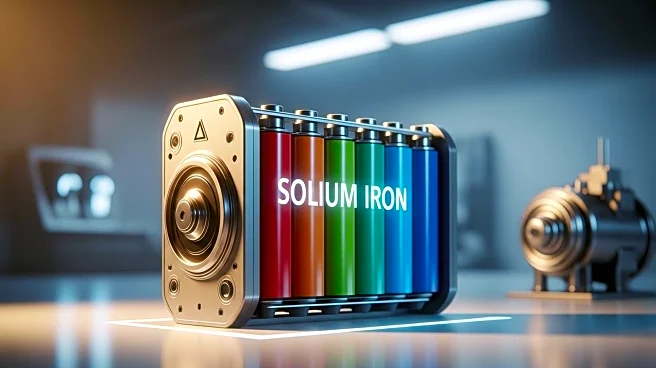What is the story about?
What's Happening?
The closure of Natron, a U.S. 'salt battery' firm, has resulted in the loss of 1,000 factory jobs, marking a setback for renewable energy stakeholders who relied on low-cost batteries for wind and solar storage. Despite this, Inlyte, another U.S. energy storage startup, is progressing with plans to produce sodium-iron batteries domestically. These batteries are designed for long-duration renewable energy storage, offering advantages such as non-toxicity and cost-effectiveness. Inlyte's efforts include a partnership with HORIEN Salt Battery Solutions and a $4 million grant from the Energy Department to develop energy resilience projects in high-risk wildfire areas.
Why It's Important?
The closure of Natron highlights challenges in the renewable energy sector, particularly in job creation and sustaining manufacturing operations. Inlyte's continued development of sodium-iron batteries represents a significant opportunity for advancing energy storage technology, crucial for the transition to renewable energy. This technology promises longer storage durations compared to lithium-ion batteries, potentially enhancing grid resilience and reducing reliance on fossil fuels. The success of Inlyte's projects could lead to broader adoption of sodium-based storage solutions, benefiting both economic and environmental stakeholders.
What's Next?
Inlyte plans to integrate its sodium-iron battery system into a microgrid with solar arrays, aiming for operational independence during outages and significant cost savings. The company is also collaborating with Southern Company on a utility-scale demonstration in Alabama, with results expected to influence broader utility networks. The involvement of industry leaders in Inlyte's executive team signals a shift towards commercial-scale production, potentially expanding the reach and impact of sodium-iron technology in the energy sector.
Beyond the Headlines
The development of sodium-iron batteries by Inlyte could have long-term implications for energy storage technology, offering a sustainable alternative to lithium-ion batteries. This shift may influence regulatory policies and investment strategies in the renewable energy sector, promoting innovation and resilience in energy infrastructure. Additionally, the focus on non-flammable and environmentally friendly solutions aligns with global efforts to reduce carbon emissions and enhance energy security.















